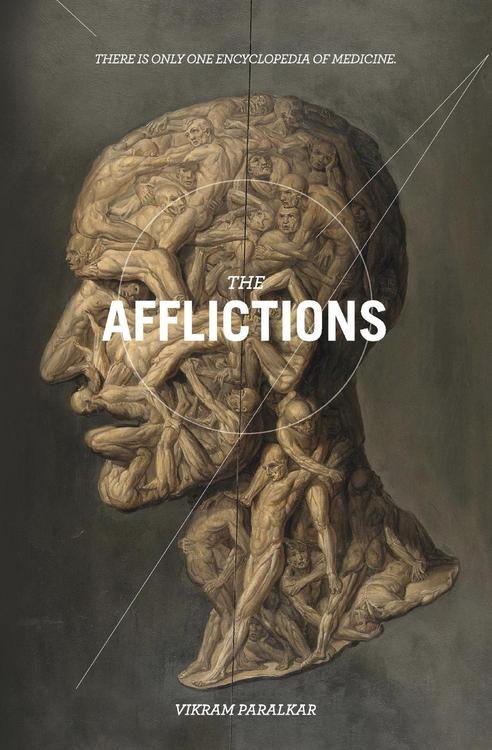
A Review of Vikram Paralkar’s The Afflictions
Disease is made into something new and strange through the eyes of writer-scientist Vikram Paralkar. In his debut book The Afflictions, Paralkar takes advantage of long held associations of medicine with magic to literalize our most darkly-held superstitions about illness.
The book claims to be a collection of entries from the fictional Encyclopedia of Medicine, a compendium of surreal and arcane materia medica. But behind the pseudo-medieval setting and the Calvino-style diction is a meditation on the symbolic resonances of the word “affliction.”
In one of the entries, a man afflicted with Corpus ambiguum can no longer understand the boundary between his body and the rest of the world. “On being asked to sketch pictures of themselves, invalids with this condition often draw incomplete versions of their own bodies, surrounded by amorphous auras and clouds of disjointed appendages.” A woman diagnosed with Persona fracta, on the other hand, is “unable to think of the ‘she’ who walked and the ‘she’ who spoke as the same individual.”
Haltingly, slowly, another story emerges from these encyclopedia entries. The framing narrative and the heart of The Afflictions is the story of Máximo, a young apothecary who wants to become a librarian. As he is guided through the workings of the vast “Central Library” by an elderly librarian, more and more bizarre medical entries are presented to the reader. In one of the more masterful narrative strokes in the book, the nature of Máximo’s own affliction is never fully explained but merely hinted at, mirroring how the encyclopedia itself only hints at the full scope of maladies that can potentially afflict us. As the elderly librarian warns Máximo, “If you read the Encyclopaedia from beginning to end, you get the feeling that every affliction known to man is part of a single, infinite progression. Or that every disease is a different facet of one great and terrible malady.”
If all this reminds you of a certain Argentinian short story writer, it should—Paralkar cites Jorge Luis Borges as his literary idol. The prose of The Afflictions at times can read like an imitation of Borges’, and Paralkar shares with Borges a collector’s delight in details. One can practically feel Paralkar luxuriating in the task of describing some of the three thousand essences of sounds distilled for the treatment of Agricola’s disease, “some that restore the invalid’s ability to hear the wings of sparrows, others that cover the lower sonorities of dulcimers, yet others that are concerned with the sounds of raindrops.”
But Paralkar’s obsession with minutiae and the archaic are more than just literary mimicry. The medieval world of The Afflictions is a vast,...
You have reached your article limit
Sign up for a digital subscription and continue reading all new issues, plus our entire archives, for just $1.50/month.
Already a subscriber? Sign in




